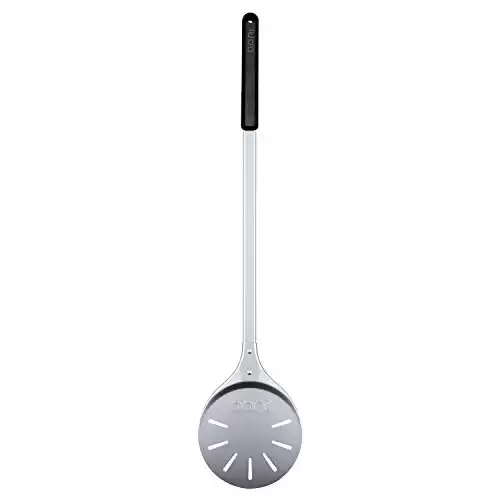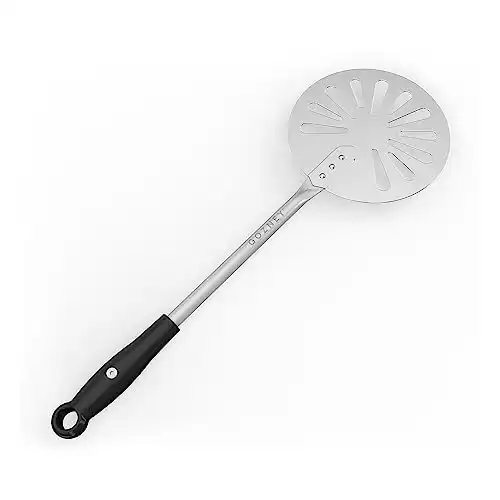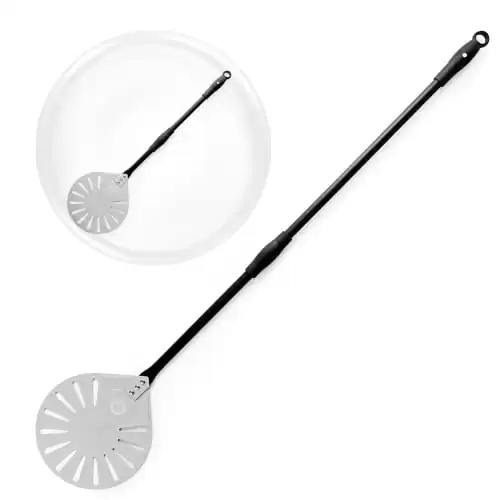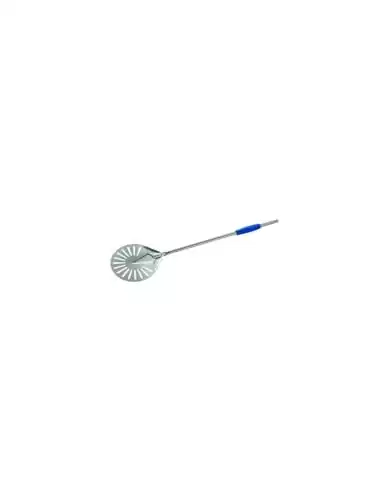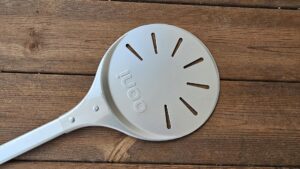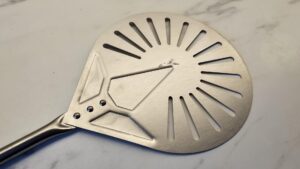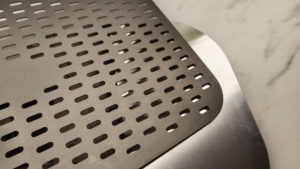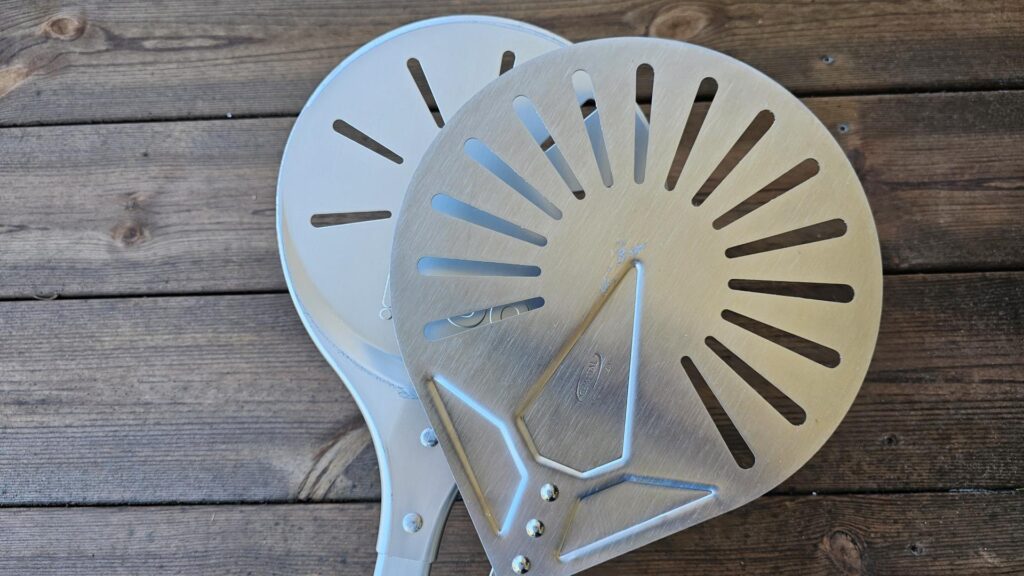
There’s a fine line between perfectly charred and burnt pizza crust. A pizza turning peel is essential for keeping your pizzas on the right side of that line when baking in a hot oven.
The turning peel simplifies moving, turning, and checking your pizza. It gives you complete control over the baking process. This control is crucial, especially with the intense heat needed for authentic Neapolitan pizza.
Having used a variety of turning peels, from a simple pizza stone in my home ovens to
In this article, I’ll explain exactly what a pizza turning peel is, who it’s for, and how it can improve your pizza baking. I will also share reviews and insights on the best pizza turning peels I recommend, helping you choose the right peel whether you’re a professional chef or a home-cooking enthusiast
Choosing the best Pizza turning peel: in-depth reviews and comparison
Choosing the right pizza turning peel can dramatically improve your pizza-making experience. Below, you’ll find a detailed comparison table that highlights the key features of each recommended peel. This will help you quickly assess which tool might be the best fit for your needs. Following the table, I provide in-depth reviews of each peel, sharing personal insights and practical tips to guide your decision.
|
4.5
|
4.5
|
4.7
|
4.8
|
|
|
|
|
|
|
|
|
|
$65.00
|
N/A
|
$33.99
|
N/A
|
- Light-weight
- Comfortable to use
- Reasonably priced
- Perfect size for portable pizza ovens
- Scratches easily
- Perfect size for Gozney Roccbox and home ovens
- Lightweight and easy to use
- Comfortable grip
- Limited to smaller ovens
- Versatility with adjustable and detachable handle
- Works with any oven size
- Value for money
- Light-weight
- The aluminum is not as sturdy as stainless steel
- Durable stainless-steel construction
- Can handle frequent, heavy use
- The sliding handle give control and comfort
- Comes in every size
- Expensive
- Heavier than aluminum peels
1. Chef Pomodoro Supreme Aluminum 9-Inch Turning Pizza Peel – the most versatile budget peel
The Chef Pomodoro Supreme Aluminum 9-Inch Turning
Priced at around $60, this turning peel is affordable while offering features that cater to a broad range of pizza-making environments, from compact home kitchens to larger, outdoor settings.
Key Features of Chef Pomodoro Supreme Aluminum Turning Peel:
- Material: Durable lightweight aluminum.
- Size: 9-inch (23cm) diameter, ideal for various styles of pizzas from Neapolitan to New York-style.
- Handle: Adjustable length, extending up to 47 inches (120cm), which can be shortened to accommodate small, portable ovens.
- Special Features: Oven-safe, features a detachable handle for easy storage, and is designed for versatile use.
- Weight: 1.34 pounds (0.6kg), providing a balance of lightweight maneuverability and robust handling.
Pros and Cons:
Pros:
- Excellent value for money
- Adjustable and detachable handle enhances usability across different oven sizes
- Lightweight yet sturdy enough for regular use across various settings
Cons:
- While versatile, the aluminum may not offer the longevity of stainless steel
- The 9-inch head might feel slightly large for smaller Neapolitan pizzas
In-depth review:
The Chef Pomodoro peel is a great all-round
The peel’s ability to adapt from larger to smaller ovens with ease, along with its detachable feature for storage, makes it a great tool especially suitable if you appreciate flexibility, or own several different ovens. Although it is constructed from aluminum, which may not have the endurance of higher-end materials, it performs exceptionally well across a variety of baking conditions and is still a great choice for its price.
Ideal for:
User: Ideal for home pizza makers who value flexibility and need a peel that can adapt to various oven types and sizes.
Oven Type: Excellently suited for a wide range of ovens, from small home ovens to larger, outdoor wood-fired ovens.
The Chef Pomodoro Supreme Aluminum Turning
2. Ooni Turning Peel: the best turning peel for Ooni and other portable ovens
The
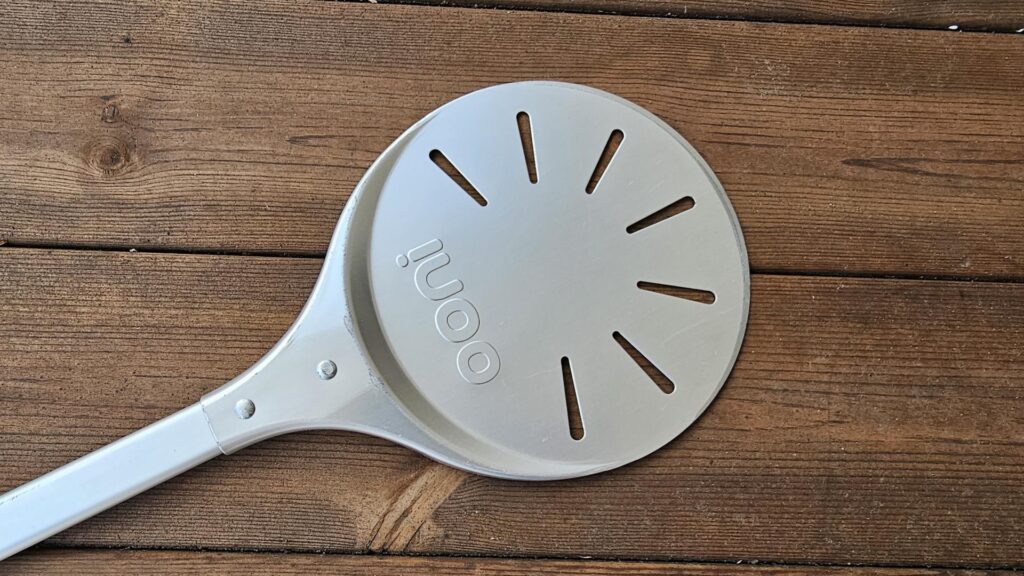
Key Features:
- Head Size: 7 inches (17 cm) diameter, ideal for 12-inch Neapolitan pies.
- Overall Length: 32 inches (80 cm), perfect for reaching into small and moderately sized ovens.
- Weight: At just 1 pound (0.4 kg), it’s exceptionally lightweight.
- Materials: Made from high-quality aluminum with a heat-resistant glass-reinforced nylon handle, offering durability and high heat resistance.
Pros and Cons:
Pros:
- Extremely lightweight, making it easy to use and increase maneuverability.
- The perfect size for home pizza ovens.
- Durable materials suited for high temperatures.
Cons:
- Aluminum shows wear over time, which could be a cosmetic concern.
- The handle could be smoother to enhance comfort during prolonged use.
In-Depth Review:
I’ve baked over 1000 pizzas with the
The peel is made from aluminum, which is why it is so light. The material does show scratches and signs of wear, but it hasn’t had any impact on performance. It can still handle the high heat of pizza ovens with ease. The ergonomic handle design remains cool during baking in the intense heat. It’s not the most comfortable handle I’ve used, but it still provides a firm grip.
Discover more about how this peel can improve your pizza-making in our comprehensive Ooni turning peel review.
Ideal for:
User: Home pizza chefs and enthusiasts who prefer a lightweight, easy-to-use peel for frequent but not professional-level use.
Oven Type: Best suited for portable and home pizza ovens like the Gozeny or
The
3. Gozeny Roccbox Pizza Turning Peel – Best for Small Ovens
The Gozney Roccbox Pizza Turning Peel is well-crafted to complement the Roccbox
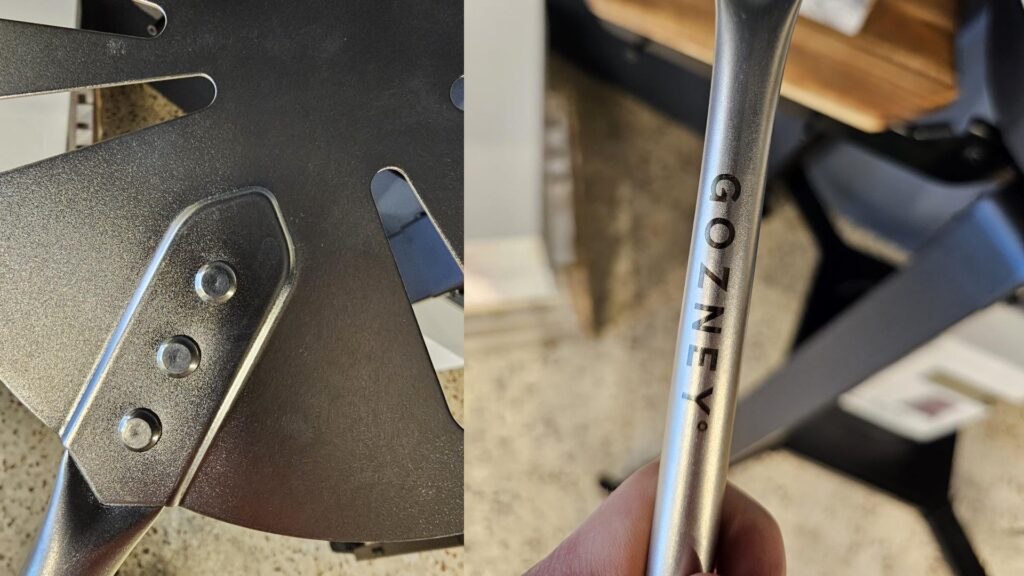
Key Features:
- Material: Made from stainless steel, providing durability and resistance to high temperatures.
- Size: The peel’s head is 6.7 inches (17 cm) in diameter, making it ideal for 12-inch Neapolitan pizzas.
- Handle: 12.5 inches (32cm) long, designed for easy handling within compact ovens.
- Design: Slimline, circular surface that easily slides under the pizza for easy turning and placement.
- Weight: 1.45 pounds (0.7kg), balancing lightness with the necessary sturdiness for effective use.
Pros and Cons:
Pros:
- Perfectly sized for Roccbox and similar small pizza ovens as well as kitchen home ovens.
- Lightweight design enhances maneuverability without sacrificing strength.
- Comfortable grip.
Cons:
- Limited to smaller oven sizes due to its compact design.
- May not be as versatile for larger or commercial oven applications.
In-Depth Review:
Designed specifically for the Gozney Roccbox, this turning peel is perfect for small pizza ovens. During my tests, I found the peel to be durable and well-constructed. The stainless steel can handle the intense heat from a
Its lightweight design and comfortable grip make it easy to handle, even during busy cooking sessions. The 6.7-inch (17cm) diameter of the peel head fits perfectly within the confines of small ovens, making it particularly effective for personal-sized Neapolitan pizzas.
One of the things I really like about this peel is how smoothly it slides under the uncooked pizza. The slim design of the head makes sliding under the bottom a breeze. This feature minimizes the disruption to the dough, crucial when dealing with the delicate textures of partially cooked pizzas.
Ideal for:
User: Best suited for owners of the Gozney Roccbox and similar portable ovens, as well as home chefs using a pizza stone in a standard home oven.
Oven Type: Optimally designed for small, high-temperature ovens where space and precision handling are paramount.
The Gozney Roccbox Pizza Turning Peel is an essential pick for anyone with a small
4. Gi.Metal perforated turning peel: the best peel for a wood-fired pizza oven
The Gi.Metal turning peel is a popular choice among the best pizzaiolos in Naples. It’s also my personal favorite turning peel. It has proven indispensable in my own high-volume pizza baking. Designed and made in Italy, this peel combines precision engineering with practical functionality. It’s the top choice for professionals and serious pizza enthusiasts looking for the best tool for their pizza-making.
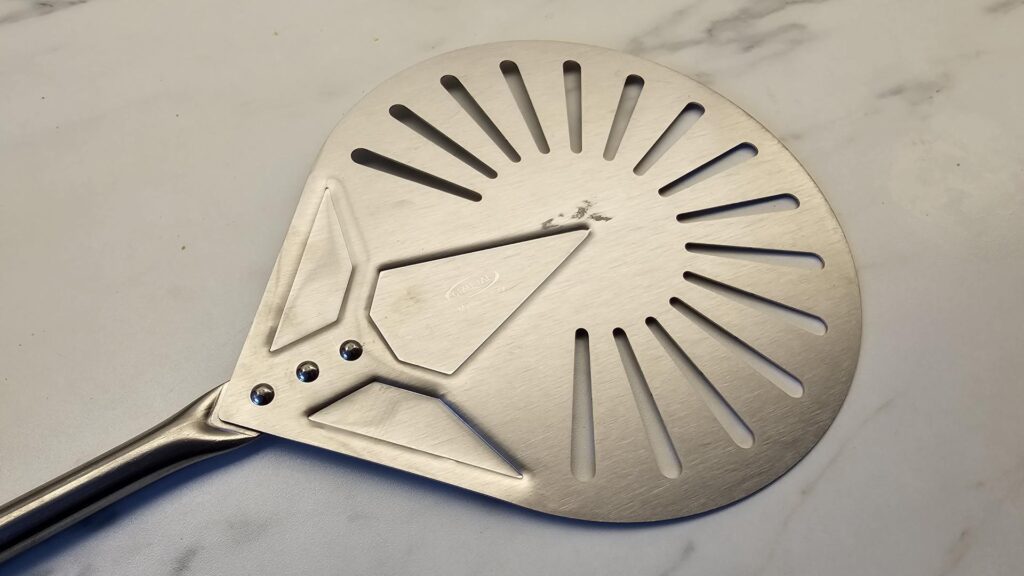
Key Features:
- Material: High-quality stainless steel for longevity and resistance to high temperatures.
- Sliding Handle: Provides excellent maneuverability and comfort, reducing fatigue in long baking sessions.
- Variety of sizes: Available in diameters from 6.7 inches (17 cm) to 10 inches (26 cm), and with a handle length from 29 inches (75 cm) to 71 inches (200 cm), catering to a wide range of pizza sizes and oven dimensions.
Pros and Cons:
Prod:
- Durable construction withstands frequent and heavy use.
- The ergonomic sliding handle enhances control and comfort.
- Versatile size options fit both small home ovens and large commercial setups.
Cons:
- Expensive, ranging from $80-120 depending on size.
- Heavier than aluminum peels, which could be a drawback for some users.
In-Depth Review:
What impresses me the most about the Gi.Metal turning peel is the solid feel and exceptional balance. The peel is easy to manage even the most delicate pizzas under intense heat.
I was first introduced to this peel by one of the top pizzaiolos in Naples. He insisted that this was the best turning peel, and had nothing but good to say about it. I immediately loved it too, it just felt better constructed than any other turning peel I’ve used. So I bought my own immediately when I got back home.
Its stainless steel construction is durable, but also provides a clean, smooth surface that slides under pizzas effortlessly. The sliding handle is a game-changer for me. It allows adjustments on the fly and makes it easier to navigate the oven’s interior without the risk of burns. For a closer look at its design and performance, read our full Gi.Metal turning peel review.
One of the best things about the peel is the wide range of options. You can get it with different head sizes and handle lengths to perfectly fit your needs. Whether you’re using a compact
Ideal for:
User: Professional chefs and dedicated home pizza makers who value precision and durability in their baking tools.
“Oven Type: Perfect for wood-fired ovens and high-temperature commercial pizza ovens, but versatile enough for any oven type, including smaller home models like
Although the Gi.Metal turning peel is a significant investment, its performance, build quality, and ergonomic design justify the cost for those who bake frequently and at high volumes. For professional settings and serious enthusiasts, it remains unmatched, providing a blend of functionality and durability that enhances the pizza-making experience. For casual bakers, however, more budget-friendly options might be advisable.
What is a pizza turning peel?
A pizza turning peel is a specialized tool designed to help you rotate and manage pizzas during high-heat baking. It’s essential for making Neapolitan pizza, which is baked at temperatures close to 1000°F (or 500°C). The primary function of this tool is to allow for easy rotation and checking of doneness without having to remove the pizza from the oven, giving you precise control over the baking process.
The turning peel consists of two main parts: a long handle and a small, round base.
The handle varies in length but should always be long enough to safely reach anywhere in the oven without exposing you to high heat.
The head, or carrying surface, of the peel is typically thin and small, usually about 6-10 inches in diameter. It’s designed to be smaller than the pizza itself, making it easier to slip under and maneuver the pizza. While older turning peels are often made from wood, most modern versions are made from durable metals like stainless steel or aluminum. These metal pizza peels are not only better at handling the high heat of a
In essence, a pizza turning peel is invaluable for managing the intense heat of any oven, from traditional wood-fired to smaller portable models like the
The purpose of a pizza turning peel
A pizza turning peel is essential when baking pizza in the intense heat of a
It serves several crucial functions that go beyond simply moving the pizza:
- Turning the pizza to ensure even baking and prevent burning.
- Moving the pizza within the oven to ensure even baking of the bottom.
- Checking for doneness by lifting the edge to peek underneath.
- Finishing the baking of the top of the pizza by “doming” it, lifting the pizza closer to the oven’s dome.
- Retrieve the pizza from the oven when it’s done.
- Increasing efficiency, allowing you to handle multiple pizzas simultaneously.
Control Baking and Avoid Burning
Not every
The main challenge of baking with fire is its unpredictability. The temperature will vary depending on the intensity of the fire and how long it has been heating up. A
A turning peel will help you manage this process. If the edge browns too quickly, you can turn the pizza to prevent burning. You can also lift the edge to check the bottom’s doneness, and “dome” the pizza if the bottom finishes before the top. A turning peel allows you to make real-time adjustments based on what you observe and feel.
Doming the Pizza
“Doming the pizza” means lifting the pizza from the oven floor to the blazing hot dome of the oven. This technique allows you to quickly finish baking the top of the pizza. It’s particularly useful when the oven floor is overly hot and cooks the bottom of the pizza too quickly. By “doing” the pizza, you can ensure the toppings and crust achieve perfect doneness without overcooking the base, balancing the cooking process effectively.
Dedicated laughing and turning peels
It’s crucial to differentiate between peels for launching and turning pizza.
Launching Peels is essential for starting right
These peels are specifically designed for sliding pizzas into the oven. A good launching peel needs to be large enough to fit the pizza. It also needs a smooth, flat surface to prevent the raw dough from sticking. Keeping this peel cold and dry is essential, as a cold peel minimizes condensation, which reduces the risk of the pizza dough sticking. This is why having a dedicated cold launching peel is beneficial. It ensures that each pizza can be placed into the oven cleanly and without disruption.
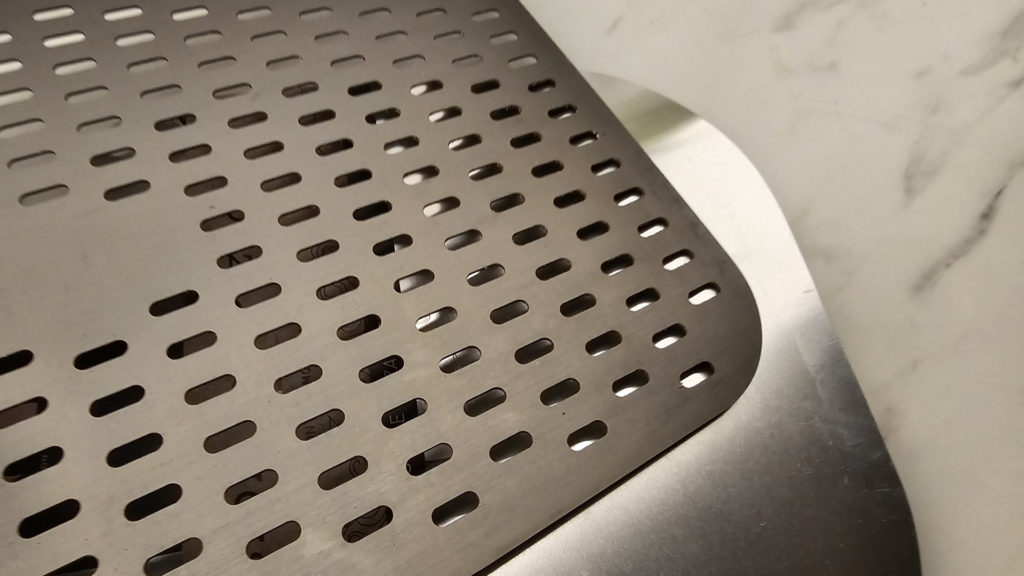
Turning Peels gives full control over the bake
In contrast, turning peels are smaller and typically have a thinner blade. This design makes it easier to maneuver the peel under the pizza for turning or repositioning it within the oven without damaging the crust. The smaller size and thinner blade are crucial for subtly lifting and rotating the pizza, ensuring even cooking and preventing any one section from burning. A turning peel’s design should allow for delicate handling, which is vital in tightly controlled cooking spaces like those found in professional pizza kitchens.

For more detailed information on different types of pizza peels and their uses, check out our comprehensive guide on the best pizza peels here.
Speed, Efficiency, and ability to handle multiple pizzas
You can use a regular
With a turning peel, you can rotate the pizza right on the spot. This ensures that the pizza remains in the same location throughout the baking process, maintaining consistent heat exposure. When a pizza is moved to a new spot on a hot oven floor, it’s likely to burn. This happens because the floor cools where the new, cold pizza is placed, slowing the initial baking process. If you move the pizza mid-bake, to a different spot, the already hot floor can cause the pizza to bake too quickly and burn.
Another big advantage of using a turning peel is the ability to manage multiple pizzas simultaneously. When pizzas are turned in place, it reduces the need to move them in and out of the oven. This allows you to bake more than one pizza at a time without the risk of any burning. This is crucial in busy settings where time and efficiency are paramount.
Who Needs a pizza turning peel?
Is a pizza turning peel necessary for your kitchen? The answer depends on where and how you plan to bake your pizzas.
A pizza turning peel is crucial when baking Neapolitan pizza in a hot
Even in a regular home oven, the temperature can vary within the oven, and a turning peel will help you achieve an even bake. In my experience, the front of my oven gets hotter than the back, so I need to turn the pizza at least once to get an even bake.
However, if you’re baking sheet pan pizza in a regular home oven, a turning peel isn’t necessary.
In summary, a pizza turning peel is essential when baking in a hot
Choosing the right turning peel
Selecting the right turning peel is key to enhancing your pizza-making experience. You’ll want a peel that’s lightweight, durable, and perfectly sized for both the pizzas you make and the oven you use.
In this section, we’ll go through the key features to consider.
Material
A wooden peel is the traditional choice. Today, most high-performance turning peels are made from metal, significantly improving durability and maintenance. Metal peels offer a slim profile for better control, making it much easier to maneuver, lift, or adjust your pizza. You’ll generally find them in two types:
- Aluminum: This metal is lighter and typically less costly, making it a great option for casual use or home pizza makers.
- Steel: Known for its strength and lasting durability, steel is the go-to material for professionals who need a peel that can withstand heavy use.
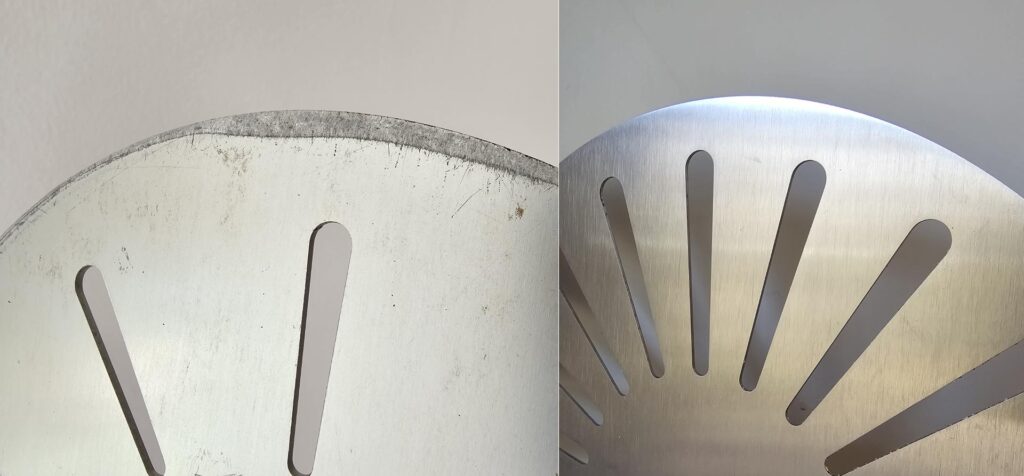
Size
The size of the peel head is typically between 6 to 10 inches in diameter. Choosing the right size depends on the pizzas you plan to bake:
- Smaller pizzas: Opt for a peel head that measures 6 and 8 inches if you’re making personal-sized pizzas like a classic 12-inch Neapolitan.
- Large pizzas: For bigger varieties such as New York-style pizzas, choose a peel head that is 8 to 10 inches wide.
Handle length
The handle length ideal handle length depends on the size of your oven.
For home ovens, a shorter handle works best here. Opt for a peel with a handle length of 20-30 inches (50-75cm). If you use a small, portable pizza ovens (like
The right handle length enhances safety and convenience by fitting the size of your oven.
| Oven type | Handle length in inches | Handle length in inches |
| Home oven | 20-30 inches | 50-75 cm |
| Portable pizza ovens (like | 20-30 inches | 50-75 cm |
| Large, commercial ovens | 45-70 inches | 120-200cm |
| Wood-fired ovens | 45-70 inches | 120-200cm |
How to Use a Pizza Turning Peel
Using a pizza turning peel correctly can significantly improve the quality of your pizzas by ensuring they are cooked evenly, preventing burning, and making the handling process of homemade pizzas more efficient. Here’s a step-by-step guide on how to use a pizza turning peel effectively:
Step 1: Preparing the Peel
Before you slide your pizza into the oven, make sure your turning peel is clean and dry.
Step 2: Launching the Pizza
Using the Launching Peel: If you have a dedicated launching peel, place your prepared pizza on it. Sliding into the Oven: Gently shake the peel to ensure the pizza is not sticking, then slide it smoothly into the preheated oven.
Step 3: Monitoring and Turning
Allow the pizza to cook for 10-20 seconds or so until the crust begins to set. Then carefully release the pizza from the floor to ensure it’s not stuck.
Using your turning peel, slide it gently under the pizza, lift it slightly, and rotate it. This helps the pizza cook evenly, especially in spots that may be hotter.
Continue to monitor the pizza and turn it in smaller increments if needed to ensure every part gets evenly exposed to the oven’s heat.
Step 4: Checking for Doneness
Periodically use the turning peel to slightly lift and check the underside of the pizza. Look for a light charring on the bottom as an indicator of doneness. It should not be black. Be attentive to the toppings and edges, making sure they don’t burn.
Step 5: Doming the Pizza (if necessary)
If the bottom of the pizza is cooking faster than the top carefully lift the pizza with the peel and hold it closer to the ceiling of the oven for a few seconds. This technique allows the top to receive more intense heat without overcooking the base.
Step 6: Retrieve the Pizza from the oven
Once the pizza is perfectly cooked, firmly slide the turning peel under the entire pizza. Lift it carefully and transfer it to a cutting board or serving plate.
Additional Tips for using pizza peels
- Practice makes perfect: Handling a turning peel with confidence comes from practice. Spend time getting to know your oven’s hot spots and how your peel handles.
- Maintenance: After each baking session, clean your peel to keep it in good condition. For metal pizza peels, a simple wipe-down is often enough. Store it in a dry place to prevent any potential damage.
Q&A
What is the purpose of pizza turning peel?
A pizza turning peel is essential for managing and perfecting the pizza-baking process. It allows bakers to control baking temperatures and avoid burning by adjusting the pizza’s position in the oven. It also allows you to check for doneness, “doming” and retrieving the finished pizza from the oven.
Do you really need a pizza turning peel?
A pizza turning peel is crucial if you’re baking in high-heat pizza ovens. It provides essential control for even baking and prevents the pizza from burning, allowing for adjustments like doming to perfectly finish the pizza. However, if you’re baking pan pizza in a regular home oven, a turning peel isn’t necessary.
What size pizza turning peel do I need?
For personal size pizzas, such as 12-Neapolitan you need 6-8 inches. For larger New York or family-size pizza 8-10 inches.
How much does a pizza turning peel cost?
The cost of a pizza turning peel can vary depending on the material and brand. Typically, you can expect to pay between $50 to $100 for a good-quality peel. Higher-end models, particularly those designed for professional use or made from premium materials, may cost more but offer greater durability and performance.
What’s the difference between a launching peel and a turning peel?
Launching peels are typically larger and have a smoother surface to help slide the pizza into the oven easily. They’re usually kept cold to prevent the dough from sticking. Turning peels, on the other hand, are smaller with a thinner blade, making them ideal for maneuvering and rotating the pizza once it’s inside the hot oven.
How often should I turn my pizza in the oven?
The frequency of turning depends on the oven’s heat distribution and hot spots. Generally, a pizza should be rotated after the pizza sets, which usually takes 10-20 seconds. Keep turning to ensure an even bake
What is “doming”?
Doming means lifting the pizza closer to the dome or ceiling of the oven to finish the top faster. The technique is useful when the pizza’s bottom is cooking faster than the top.
To “dome” your pizza, simply slide the turning peel under the pizza, lift it gently, and hold it near the oven’s roof for a few seconds.
Related
- Is Your Pizza Dough Too Dry? Here is How to fix it! - June 10, 2024
- The Ultimate Guide to the Pizza Dough Windowpane Test - June 8, 2024
- The Ultimate Guide to Autolyse Pizza Dough - June 7, 2024
